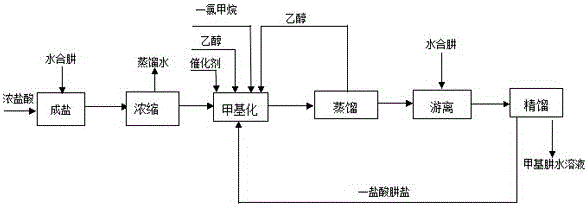Novel method of catalytic synthesis of methylhydrazine under normal pressure
A synthesis method and technology of methylhydrazine, applied in the fields of hydrazine preparation and organic chemistry, can solve the problems of high toxicity of dimethyl sulfate, increase of sodium salt treatment cost, difficulty in industrial production, etc., to achieve convenient continuous production, improve Product selectivity, the effect of easy industrial production
- Summary
- Abstract
- Description
- Claims
- Application Information
AI Technical Summary
Problems solved by technology
Method used
Image
Examples
Embodiment 1
[0041] Slowly add 192.1g (2.0mol) of 38% concentrated hydrochloric acid dropwise to 125g (2.0mol) of 80% hydrazine hydrate. Under the condition of stirring, control the temperature at 20~30°C and keep it warm for 2 hours. After the reaction is complete, measure the pH=6, distill off the water under reduced pressure, mix the obtained hydrazine salt with 138g (3mol) of ethanol, and add coarse porous microspherical silica gel 16.0 g. Raise the reaction temperature to 73° C. and condense to reflux. Chloromethane was slowly introduced into the mixed solution at a rate of 0.56 mL / min to react for 2.3 h. The mixed solution after the reaction is distilled to separate ethanol and a small amount of water, and the ethanol can be recycled. The remaining raffinate was added to 136.0 g of hydrazine hydrate with a mass fraction of 80% for freeing. Finally, the dissociated solution was heated and rectified, and the fraction at 102-110°C was collected to obtain 98.0 g. The content of methylh...
Embodiment 2
[0043] Add 96.05g (1.0mol) of 38% concentrated hydrochloric acid dropwise to 62.5g (1.0mol) of 80% hydrazine hydrate. Under the condition of stirring, control the temperature at 20~30°C and keep it warm for 1.5h. After the reaction is complete, measure the pH=6, distill off the water under reduced pressure, mix the obtained hydrazine salt with 92g (2.0mol) of ethanol and add microporous microspheres Silica gel 8.3g, the reaction temperature was raised to 64°C and condensed to reflux, and methyl chloride was slowly introduced into the mixed solution at a rate of 0.22mL / min to react for 2h. The mixed solution after the reaction is distilled to separate ethanol and water, and the ethanol can be recycled. The remaining raffinate was added to 50 g of hydrazine hydrate with a mass fraction of 80%. Finally, the dissociated solution was heated up and rectified, and the fraction at 102-108°C was collected to obtain 63.3g fraction, with a gas phase detection content of 38.12%. The rem...
Embodiment 3
[0045] Add 134.6g (1.4mol) of 38% concentrated hydrochloric acid dropwise to 127.5g (1.4mol) of 80% hydrazine hydrate. Under the condition of stirring, control the temperature at 20~30°C and keep it warm for 1.0h. After the reaction is complete, measure the pH=6, distill off the water under reduced pressure, mix the obtained hydrazine salt with 96.6g (2.1mol) of ethanol and add coarse-pored microspheres Type 9.3g of silica gel, raise the reaction temperature to 51°C and condense to reflux, slowly inject methyl chloride into the mixed solution at a rate of 0.294mL / min, and react for 1.0h. The mixed solution after the reaction is distilled to separate ethanol and water, and the ethanol can be recycled. The remaining raffinate was added to 130 g of hydrazine hydrate with a mass fraction of 80%. Finally, the dissociated solution was heated up and rectified, and the fraction at 102-108°C was collected to obtain 42.9g fraction, with a gas phase detection content of 32.02%. The rem...
PUM
 Login to View More
Login to View More Abstract
Description
Claims
Application Information
 Login to View More
Login to View More - R&D
- Intellectual Property
- Life Sciences
- Materials
- Tech Scout
- Unparalleled Data Quality
- Higher Quality Content
- 60% Fewer Hallucinations
Browse by: Latest US Patents, China's latest patents, Technical Efficacy Thesaurus, Application Domain, Technology Topic, Popular Technical Reports.
© 2025 PatSnap. All rights reserved.Legal|Privacy policy|Modern Slavery Act Transparency Statement|Sitemap|About US| Contact US: help@patsnap.com



